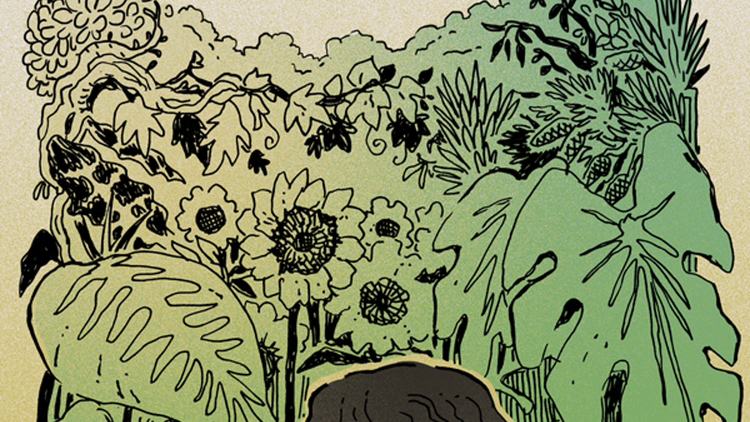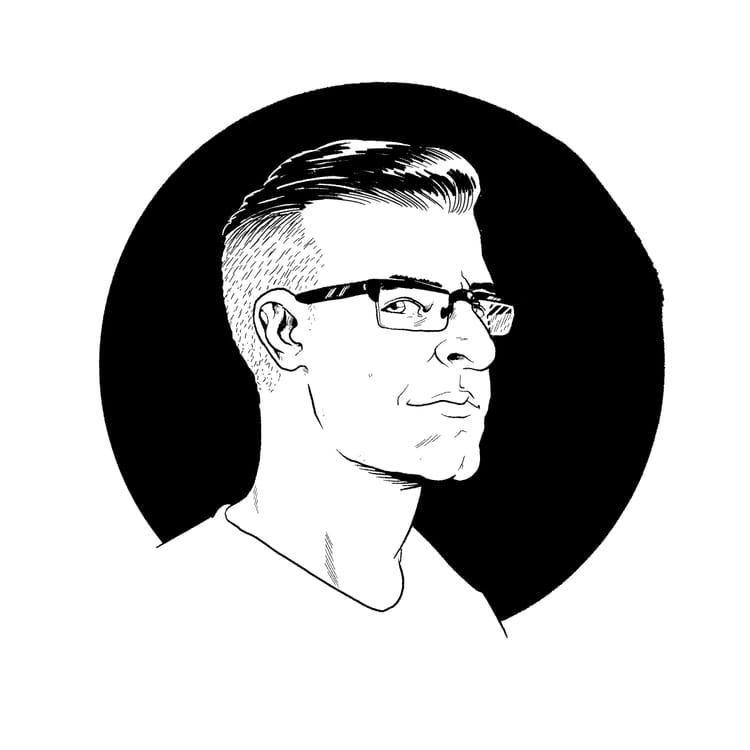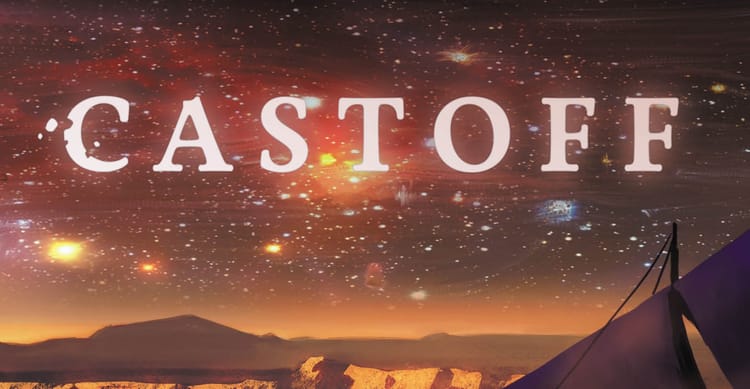Personal Canons: Warren Ellis
In addition to my own reflections and essays purchased from among the many dazzling submissions I received in response to my open call, the Personal Canons series will also feature guest posts from brilliant folks in the writing community. Last time, I wrote about Mama Day by Gloria Naylor. Today, I’m thrilled to feature Alasdair Stuart.
Alasdair Stuart is a professional enthusiast, pop culture analyst, and writer. He co-owns the Escape Artists Podcast Network, and hosts their weekly horror fiction show, PseudoPod. He is a three time Hugo finalist, writes an award-nominated weekly pop culture newsletter, The Full Lid, blogs at www.alasdairstuart.com and tweets @AlasdairStuart.

I am the motion blur of my early twenties and I’m terrified. I no longer live on a scrap of land 30km long. I’m at University, doing a Masters degree. People think I’m clever and because I believe them, I have chosen a dissertation topic for which there is precious little supporting material. My tutor reminds me of this before he goes on holiday for six weeks, at the same time that he reminds me my dissertation is due in five.
I am having A Time.
Which is why I’m still working in the library at 9 pm, trying to figure out whether the porter only I ever seem to see is real, doing both without coffee.
I am of course, procrastinating. Reading about comics. Reading Come in Alone.
Come in Alone is a Warren Ellis’ column[1] about comics, comics writing, comics retail, and creativity and thinking. It’s a manifesto with punchlines. It’s Jordan B. Peterson with a sense of humor and an ounce of self-awareness.
Also jokes. Lots of jokes. My late adolescence was a horror show. I survived it by being funny. As Taylor Tomlinson will say in 2020: ‘I’m laughing! Is it working? I’ve been practicing!’
Come in Alone is also a book about how to think and how to interact with art. Art (and jokes) got me this far. My brain is going to get me the rest of the way. Come in Alone is the first piece of media I encounter that sounds like the inside of my brain. The moment I read it, the instinct that I’m broken in some unique and useless way is heard, seen, dispelled. I realize I’m not alone, just struggling the way others struggle and I’m going to heal and I’m going to finish this dissertation because it WILL MAKE ME FEEL BETTER. I’m going to work myself healthy, I tell myself, and the book is going to help by making me feel less alone.
*
It’s 1999 and Ellis is the writer on Stormwatch[2], a series about the United Nations superhuman crisis response team. Nine brilliant, compassionate, dysfunctional no-longer-quite humans trying to make the world a better place. Hellstrike is an over-articulate Irish policeman with a fondness for jokes and a lot of inner darkness. Fuji is a cloud of sentient gas and a former champion Sumotori. One is funny, talks too fast and is clearly desperately frightened a lot of the time. The other is massive, calm, eloquent, kind and has a gloriously obtuse sense of humor. The space in the Venn diagram where they overlap is me-shaped. I am delightfully, comfortingly seen.
It holds up even today. struggling against the constraints of the superheroic ideal as the character struggle against the kill orders they receive. It’s Thunderbirds by way of Callan, Smiley’s People in Capes. Until the ending where almost everyone is killed, off-camera, by a colossally ill-advised and incompetently written Aliens crossover.
Stormwatch and Come in Alone arrive at the perfect time, entering my awareness halfway through my Masters on critical thinking and metatext. They are tools which fit my hands at a time when I despaired nothing ever would. They give me the confidence to map my way through the next two years, showing me when my voice and my brain combine there’s nothing they can’t approach or analyze. They feel sent from the future, from some distant brain like mine. They are map and territory, compass and sextant.
I cite Come In Alone in my bibliography. I get my Masters.
Later Ellis will briefly be a visiting teacher at my University. I will feel aggrieved I missed out.
*
I am twenty-five and I’m doing pretty well! I’m a manager at a comics and games store; we sell a lot of Ellis’ work. I co-edit a comics news site (one started by friends of Ellis) and I write for a second , a project generated on Ellis’ Delphi board to which I am adjacent in the same way you can be at a party if you stay in the kitchen.
I’ve had a couple of small press comics published (not paid, obviously) and I’m learning my craft as a non-fiction writer. I’m trying to be open minded, to approach everything the same way because that’s what my other critical compass point, Henry Rollins, does. A philosophy summed up as ‘Try it once, see if it’s for you, and if not move on.’ Everything deserves attention, it’s just a matter of how much attention you choose to give it.
I’ve got a LOT on. Harangued, underpaid and personality-definingly in love with the pressure, I find myself leaning on two of Ellis’ books, Transmetropolitan[3] and Planetary[4].
In an early issue of Transmetropolitan Spider sends his assistant (he later sleeps with one of them) to the corner store for supplies and with instructions to write about everyone they see on the way. I think about that a lot, still feeling like a country mouse in a big city. Not realizing the only slightly larger set of boundaries represented now not by the ocean, but ancient city walls.
I’m thinking too about Planetary, as Elijah Snow and Jakita Wagner and The Drummer dive into the same spaces as I did on my Masters. Fiction archaeologists; I like the sound of that. Not that I got anywhere near the robots and secret cities the Planetary team encountered. Most of all though, I think about the book’s motto.
‘It’s a strange world. Let’s keep it that way.’
*
I am twenty-nine and I’m falling. The comic shop has run the numbers; they need to lose three people. I’m one of them. After they give us the news, I never see one of my staff again. The other I meet years later at a friends’ wedding and we reminisce like veterans delighted the war is over but unsure where to put ourselves.
I am twenty-nine and I’m sitting on the floor of the living of the house that job helped pay for. I am trying to work out what I did wrong and if I’ll ever be employed again. I sit and stare at the TV, numbly flipping through a copy of Orbiter[5]. It’s about a group of damaged, brilliant people handed an impossible puzzle to solve.
They succeed. I re-read it at least once a week.
As Orbiter explores, sometimes getting through hurts.
*
I am thirty-five and I’m breaking. My marriage is ending. The emotional algebra of weighing the possible consequence of each syllable, the cost of each item given away, given back or jettisoned, is fading. The price of leaving slowly giving way to the calm and quiet of an empty head and a life no longer defined by the ever-shortening distances between arguments, the desperate need to dance a little faster, do a little better, to not feel anything because feelings are more a weapon that can be used against me than a tool I can wield myself.
It’s over. I am badly hurt but the pain has edges, is finite. Thanks to the people around me, I’m healing. But the wounds don’t close quickly when you live in a small town and sometimes you just want to feel normal.
So I run endless circuits of a lake near my parents’ house, a single mp3 playlist meaning Afrika Bambataa and the Pixies will forever be associated with the smell of ducks and cut grass.
So I smile at the joyous impact of my parents’ dogs shoulder against the door of the bathroom as he comes in to watch me pee.
So I start buying comics from the store I used to manage before being laid off.
That last one becomes a solace, a tiny spark against the black backdrop of sleeping on my parents’ camper bed. But it reminds me of the medium that brought me joy as joy slowly returns. This time it’s Ellis’ Secret Avengers[6] run -- Fortean and weird, kind and bleak. The team are barely in control, reacting as much as leading. But they’re still trying. Beast – large, smart, kind Beast – makes an appearance.
I buy the book three times. In singles. In trade. The last time I buy it digitally, in California with my new partner, and realize that, at last, I’m home.
*
When we move back to the UK a panel from Transmetropolitan heads my new Facebook page. It’s Spider Jerusalem, sitting on a window ledge. The text box reads:
AND SO, FREED, I BEGIN TO WRITE.
I know how he feels. It’s good to be outside at last.
*
I am rounding the corner towards forty-four and I’m reading a different kind of Ellis’ work. Somanyofus.com collects testimony from over sixty of the countless women who he’s harassed, or groomed, or manipulated over the last twenty years. Careers made or denied, glimpsed briefly from my own track but now laid out with courageous, horrifying context. Were it simply that, it would be damning. But damning is a zero-sum game. Damning is something Spider Jerusalem would do.
The writers of this site are better than that. Better than him.
There are tools here. Questions to ask, behavior to search for. Things to know as you travel the complex and protean landscape of parasocial relationships.
This corpus is not just a collection of testimony but a statement of intent, a course bearing for an industry from the very people that industry — through Ellis — has ground up and thrown aside. Those damaged the most by the toxic business they loved, hauling on the tiller and trying to steer it away from more rocks, more damage, more careers broken against the shore of this single man.
What I can’t forget is how so many of these victims defend the products of this abuse. Some explicitly call for people to forgive not the writer but the creatives he works with; the art they made, not the art he perpetrated. Tightrope-walking that fragile thread between art and artist, intent and content.
The question that must always be asked, but the answer is never the same. The question everyone with his books on their shelves must reckon with. We owe them that. To listen. To understand. To choose and own that choice.
What haunts me are the women who could have been on those books if it wasn’t for men like Ellis, hiding behind the culture they claim to subvert. He claims to be ignorant of his fame, his power. He used to refer to himself as Stalin and message board denizens as ‘Sinners’. In hindsight, it’s pathetically easy to see what he really was. But sometimes we’re all dazzled by what we need, and it’s easy to overlook its cost.
*
I am writing this six feet away from a shelf containing weighty tomes of Ellis’ work. Transmetropolitan hard backs, the Planetary omnibus, the Stormwatch collections. Books that are points on a journey, locations on a map that connect in a line from where I was to who I am now.
Soon, I’ll have to choose whether any of those locations are worth revisiting. I know some aren’t. Spider Jerusalem is no longer my Facebook banner, replaced by Professor Hulk. I am acutely aware I’m swapping a creator-owned icon for a corporate owned symbol. But I’m also swapping always-angry, always-rude, always-centred Spider Jerusalem for big, eloquent, kind, clever Professor Hulk – strength and confident compassion instead of performative righteous belligerence. Tacos for all. Much more my speed.
*
An audience doesn’t owe a creator a damn thing. Not shelf space. Not loyalty. Not forgiveness. Canon isn’t sacrosanct; it can’t be sacrosanct if you want to do anything other than ceaselessly trudge around the orbit of the same, ever-more-dusty sacred tomes. It’s a place to visit, not to live.
Ellis’ work didn’t teach me how to be a good person. It reminded me of who I already was. Ellis’ actions have shown us all who he is. Canon is your road map, not your destination. Take frequent bearings.
It’s a strange world, but don’t ever live in it on someone else’s terms.
[1] comicbookresources.com
[2] Contributions by Tom Raney, Pete Woods, Michael Ryan, Jim Lee, Oscar Jiminez, Bryan Hitch, Randy Elliott, Richard Bennett, Paul Neary, Chuck Gibson Luke Rizzo, Eduardo Alpente, Homage Studios, Scott Williams, Jason Gorder, JD, Richard Friend, Gina Going, Mick Rockwitz, Laura Dupuy, Wildstorm FX, Quantum Colour FX, Bill O’Neill, Clem Robins, Amie Grenier, Denice Park, and Mike Heisler. Yes comics are a team sport. Yes that’s a lot of people. Yes I will be crediting entire creative teams because everyone should. Yes that’s nowhere near enough women. Yes all of this is important.
[3] Contributions by Darick Robertson, Rodney Ramos, Nathan Eyring and later, a flotilla of guest stars.
[4] Contributions by John Cassaday, Laura Martin, David Baron, Wildstorm FX, Richard Starkings, Ali Fuchs, Bill O’Neill, Ryan Cline, Mike Heisler, Wes Abbott, Phil Jiminez, Andy Lanning and Jerry Ordway.
[5] Contributions by Colleen Doran, Clem Robins and Dave Stewart.
[6] Contributions by John Cassaday, Paul Mounts, Jamie McKelvie, Kev Walker, David Aja, Raul Allen, Michael Lark, Stefano Gaudiano, Brian Thies, Alex Maleev, Stuart Immonen, Dave Lanphear, Matthew Wilson, Frank Martin, Jose Villarubia, Nick Filardi, Chris Sotomayor, and Wade von Grawbadger.
Personal Canons is a series exploring the works of genre fiction that have shaped us as readers, writers, and people. This series features contributions by established authors, new and aspiring authors, readers, and fans.






Member discussion